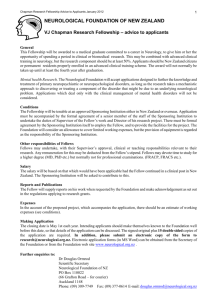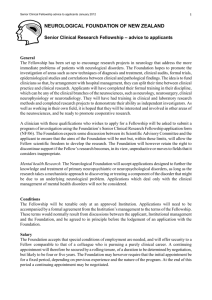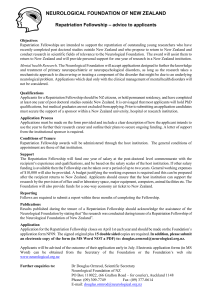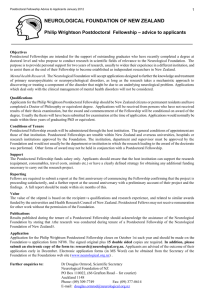NF Postgraduate Scholarship Advice to Applicants
advertisement
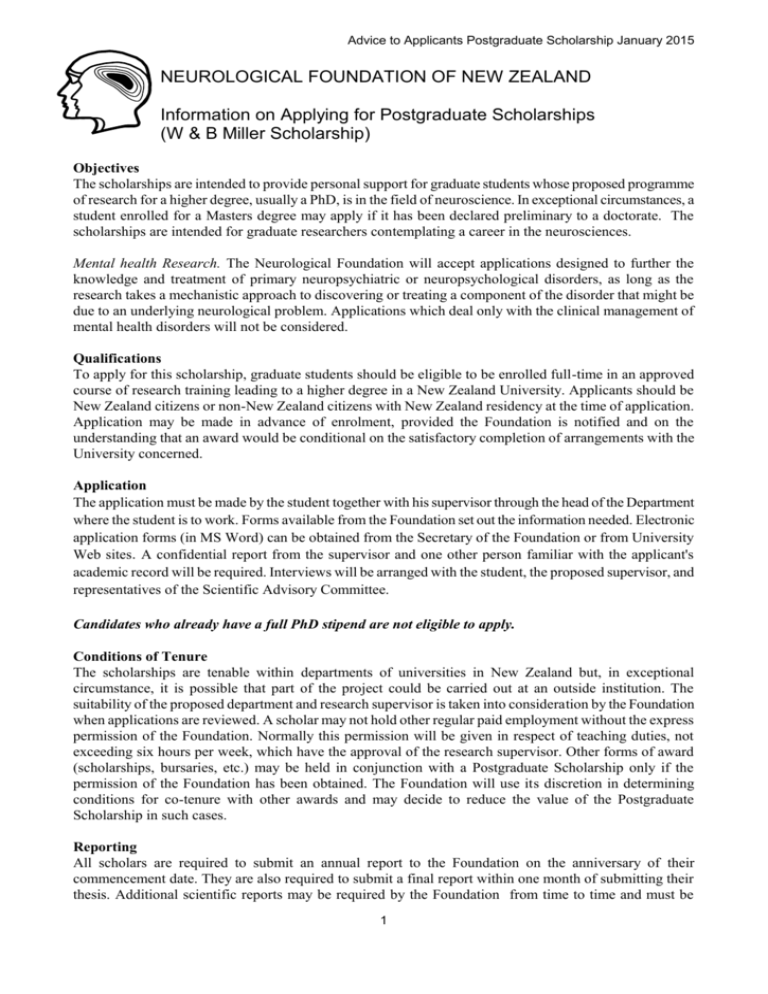
Advice to Applicants Postgraduate Scholarship January 2015 NEUROLOGICAL FOUNDATION OF NEW ZEALAND Information on Applying for Postgraduate Scholarships (W & B Miller Scholarship) Objectives The scholarships are intended to provide personal support for graduate students whose proposed programme of research for a higher degree, usually a PhD, is in the field of neuroscience. In exceptional circumstances, a student enrolled for a Masters degree may apply if it has been declared preliminary to a doctorate. The scholarships are intended for graduate researchers contemplating a career in the neurosciences. Mental health Research. The Neurological Foundation will accept applications designed to further the knowledge and treatment of primary neuropsychiatric or neuropsychological disorders, as long as the research takes a mechanistic approach to discovering or treating a component of the disorder that might be due to an underlying neurological problem. Applications which deal only with the clinical management of mental health disorders will not be considered. Qualifications To apply for this scholarship, graduate students should be eligible to be enrolled full-time in an approved course of research training leading to a higher degree in a New Zealand University. Applicants should be New Zealand citizens or non-New Zealand citizens with New Zealand residency at the time of application. Application may be made in advance of enrolment, provided the Foundation is notified and on the understanding that an award would be conditional on the satisfactory completion of arrangements with the University concerned. Application The application must be made by the student together with his supervisor through the head of the Department where the student is to work. Forms available from the Foundation set out the information needed. Electronic application forms (in MS Word) can be obtained from the Secretary of the Foundation or from University Web sites. A confidential report from the supervisor and one other person familiar with the applicant's academic record will be required. Interviews will be arranged with the student, the proposed supervisor, and representatives of the Scientific Advisory Committee. Candidates who already have a full PhD stipend are not eligible to apply. Conditions of Tenure The scholarships are tenable within departments of universities in New Zealand but, in exceptional circumstance, it is possible that part of the project could be carried out at an outside institution. The suitability of the proposed department and research supervisor is taken into consideration by the Foundation when applications are reviewed. A scholar may not hold other regular paid employment without the express permission of the Foundation. Normally this permission will be given in respect of teaching duties, not exceeding six hours per week, which have the approval of the research supervisor. Other forms of award (scholarships, bursaries, etc.) may be held in conjunction with a Postgraduate Scholarship only if the permission of the Foundation has been obtained. The Foundation will use its discretion in determining conditions for co-tenure with other awards and may decide to reduce the value of the Postgraduate Scholarship in such cases. Reporting All scholars are required to submit an annual report to the Foundation on the anniversary of their commencement date. They are also required to submit a final report within one month of submitting their thesis. Additional scientific reports may be required by the Foundation from time to time and must be 1 Advice to Applicants Postgraduate Scholarship January 2015 submitted on request. The Foundation may also arrange for an advisor to visit the scholar in his/her research setting to make a special report. Duration of Tenure The scholarship is awarded in the first place for two and a half years. The Foundation may grant an extension of this term up to the equivalent of six months full-time study in the case of scholars whose research programme cannot be completed in a shorter time. Applications for an extension will require the support of the supervisor and should, if possible, meet the 1st of April and 1st of September closing dates for project applications. In no case will the duration of a Postgraduate Scholarship exceed the equivalent of three years' full time study. Publications Any scholar who publishes the results of work performed during the tenure of a Postgraduate Scholarship is required to acknowledge the assistance he/she has received by stating, "the research was conducted during the tenure of a Postgraduate Scholarship of the New Zealand Neurological Foundation". Such publications must have the approval of the supervisor. Suspension The Foundation may, in its discretion for what is considered grave cause, suspend the tenure of a Postgraduate Scholarship for such time as is thought fit, or deprive a scholar of his/her scholarship. From that date the emoluments or other payments due shall cease. Value The value of scholarships will be determined from time to time by the Foundation but will usually be similar to an HRC Scholarship. As of December 2007, the stipend is $28,000 per annum plus University fees. Special Allowances The Foundation expects that costs of the research undertaken by Postgraduate Scholars will be borne by the host institution. Completion of Applications The closing date for applications is October 1st each year. An original containing signatures and 15 double sided copies are required. In addition, please submit an electronic copy of the form to research@neurological.org.nz. Details of subjects studied and grades obtained to date should be attached to the application form. Postgraduate Scholarships are personal awards and emphasis will be placed on the candidate and their potential to develop during the period of the scholarship. The research project itself is clearly important and sufficient detail needs to be provided to demonstrate the intrinsic value of the project per se. The format for this part of the proposal is stated on the application form and should include a description of the applicant's research interests, reasons for the particular supervisor or Department and a structured outline of the proposed project. Electronic application forms (MS Word) can be obtained from the Scientific Secretary or from the Foundation web site www.neurological.org.nz Dr Douglas Ormrod Scientific Secretary Neurological Foundation of NZ PO Box 110022 (66 Grafton Road – for courier) Auckland 1148 Phone (09) 309-7749 E-mail: douglas.ormrod@neurological.org.nz. 2 Advice to Applicants Postgraduate Scholarship January 2015 APPENDIX: FIELDS OF RESEARCH – NEUROLOGICAL FOUNDATION OF NEW ZEALAND Addiction: alcohol Addiction: other Addiction: tobacco Affective disorders Ageing AIDS: behaviour AIDS: clinical Alcohol/drug dependence Alcohol: clinical Alzheimer's disease Anaesthesia and pain management Anatomy and histology Anatomy: general Anatomy: histochemical Anatomy: ultrastructure Autonomic nervous system Behavioural science Biochemistry Biological rhythyms: sleep Biology: membrane Biology: molecular Biostatistics Brain stem Cancer: chemotherapy Cancer: clinical trials Cancer: epidemiology Cardiovascular: regulation Child health Clinical trials Community care Community health Community health: risk reduction Community health: screening Computer modelling Computing Congenital abnormalities Dentistry Depression Dermatology Diet Disability Down's syndrome Drug design/development Drug interactions Drugs Drugs of abuse Drugs of dependence Drugs: mode of action Ear disease Endocrinology: neuroendocrinology Endocrinology: pituitary Environmental health Environmental toxicology Epidemiology Epilepsy Ethics Genetic diseases Genetics: gene expression Genetics: gene mapping Genetics: gene targeting Genetics: gene therapy Genetics: general Handicapped persons Health care evaluation Health economics Health planning Health policy Health services research Health: education Health: promotion Health: protection Hearing Huntington's Chorea Hyperactivity Imaging Immunochemistry Immunogenetics Immunology: autoimmunity Immunology: basic Immunology: cellular Immunology: clinical Immunology: cytokines and growth factors Immunology: general Immunology: inflammatory processes Immunology: molecular biology Immunology: therapy Immunopathology Immunotoxins Infectious diseases Inflammation Injury: prevention Injury: unintentional Intensive care Kinesiology Language Learning Maori health Mathematical modelling Medical physics Medicine: general Memory Mental health: illness Mental health: services Mental health: wellbeing Metabolic disease Microbiology Mol & cell biology Mol & cell biology: apoptosis Mol & cell biology: cell activation Mol & cell biology: cell adhesion Mol & cell biology: cell cycle Mol & cell biology: cell 3 proliferation Mol & cell biology: developmental Mol & cell biology: differentiation Mol & cell biology: hormones & growth factors Mol & cell biology: membranes Mol & cell biology: mitosis Mol & cell biology: necrosis Mol & cell biology: receptors Mol & cell biology: signal transduction Mol & cell biology: tumour Morphology Movement Multiple sclerosis Muscular dystrophy Neural plasticity Neuroanatomy Neurobiology Neurochemistry Neurology Neurology: autonomic Neurology: central Neurology: general Neurology: peripheral Neuromuscular disease Neuropathology Neuropeptides Neuropharmacology Neurophysiology: basic Neurophysiology: clinical Neuropsychology Neuroscience Neurosurgery Neurotoxicity Neurotransmitters/neuromodul ators NMR: radiology Nursing: clinical Nursing: community Occupational health Occupational health: injury prevention Occupational health: risk reduction Occupational health: screening Oncology and carcinogenesis Ophthalmology Optometry Pacific Islander's health Paediatrics Paediatrics: adolescent Paediatrics: behavioural Paediatrics: development Paediatrics: general Pain Parasitology Parkinson's disease Pathology Pathology: anatomic Pathology: experimental Pathology: general Pathology: histochemistry and cytology Pathology: histopathology and EM Pathology: immunopathology Pathology: molecular Pathology: neuropathology Pharmacology Pharmacology: autonomic Pharmacology: clinical Pharmacology: experimental Pharmacology: general Pharmacology: molecular Pharmacology: receptors Pharmacology: toxicology Physical education Physiology Physiology: auditory Physiology: brain Physiology: cardiovascular Physiology: cellular/molecular Physiology: corneal Physiology: developmental Physiology: ear Physiology: general Physiology: ion exchange/transport Physiology: muscle Advice to Applicants Postgraduate Scholarship January 2015 Physiology: sensory Psychopathology Physiology: smooth muscle Psychopharmacology Physiotherapy Psychotherapy Poisons and chemicals Public health Prescribing Quality of life Preventive medicine Rehabilitation medicine Primary health care Reproduction Psychiatry Schizophrenia Psychiatry: adolescent Serotonin Psychiatry: adult Sexuality Psychiatry: autism Sleep Psychiatry: child Social work Psychiatry: epidemiology Speech Psychiatry: forensic Spina Bifida Psychiatry: general Spinal cord Psychiatry: liaison Sports medicine Psychiatry: psychosomatic Sudden Infant Death Psychiatry: psychosomatics Syndrome Psychiatry: psychotherapy Suicide Psychiatry: social Surgery Psychology: adolescent Surgery: clinical Psychology: adult Surgery: experimental Psychology: basic Survey methodology Psychology: behaviour Tissue culture: embryonic analysis stem cells Psychology: child Tissue culture: mammalian Psychology: clinical cells Psychology: community Tissue culture: organs Psychology: development Toxicology Psychology: forensic Trauma Psychology: psychometrics Vision Psychology: social Weight disorders 4
